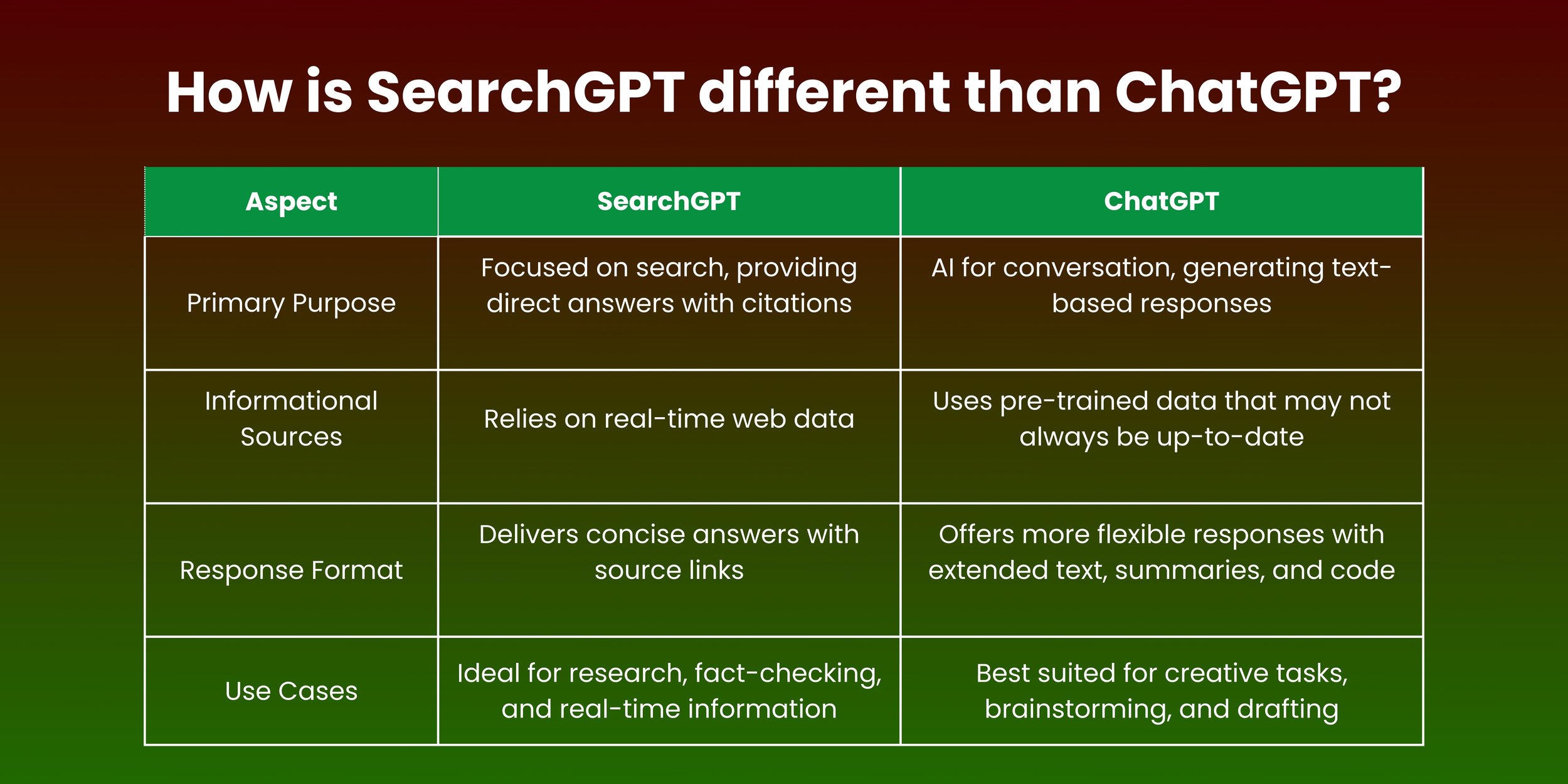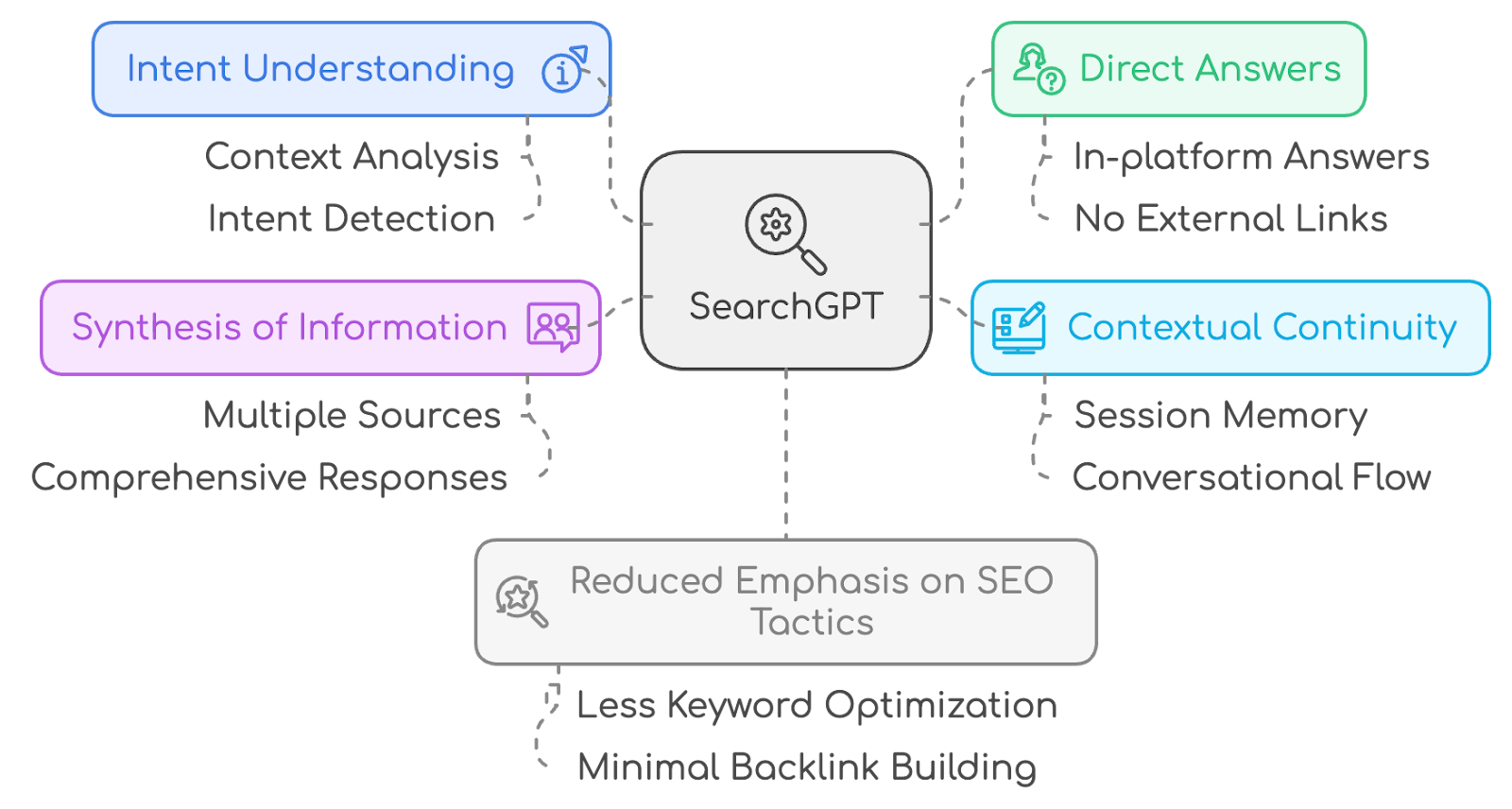Growth Marketers guide to SearchGPT
In the ever-evolving landscape of growth marketing, a new player has emerged that promises to revolutionize the way we think about search: OpenAI's SearchGPT. Launched on July 26, 2024, this AI-powered search engine is not the same as Google, Bing or Quora search — it's a glimpse into the future of how users will interact with information online.
As growth marketers, we're always on the lookout for the next big thing that can give us an edge. SearchGPT is promising to be that next big thing. It combines the power of GPT language models with traditional search capabilities, offering a unique blend of conversational AI and real-time information retrieval. This guide will walk you through what SearchGPT is, why it matters, and how you can adapt your strategies to thrive in this new era of AI-powered search.
By the end of this guide, you'll understand:
The key features of SearchGPT and how they differ from traditional search engines
Strategies for optimizing your content for AI-powered search
How to measure success in a world where click-through rates may become less relevant
Ways to future-proof your growth marketing strategies in the age of AI
Let's dive in and explore how SearchGPT is set to transform the digital marketing landscape.
What is SearchGPT?
SearchGPT is OpenAI's innovative entry into the search engine market. Unlike traditional search engines that primarily rely on keyword matching and link analysis, SearchGPT leverages advanced language models to understand and generate human-like responses to user queries. It's currently in a prototype stage, available to a limited number of test users, but its potential impact on the search landscape is already causing waves in the marketing community.
Key Features and Capabilities
Conversational AI Interface: Users can ask questions in natural language, just as they would in a conversation with a knowledgeable friend.
Real-time Information: Unlike its predecessor ChatGPT, SearchGPT has no knowledge cutoff. It accesses and processes the most up-to-date information available on the web.
Comprehensive Answers: Instead of providing a list of links, SearchGPT generates detailed, multi-faceted responses that synthesize information from various sources.
Visual Results: The platform can incorporate relevant images and videos into its responses, enhancing the user experience.
Clear Attribution: All information is clearly sourced, with links provided for further exploration.
Ad-free Environment: Currently, SearchGPT operates without advertisements, offering a clean, distraction-free user experience.
The SearchGPT Advantage for Growth Marketers
1. Real-time Information Without Knowledge Cutoff
One of the most significant advantages of SearchGPT for growth marketers is its ability to access and process real-time information. This feature opens up exciting possibilities:
Timely Campaigns: You can create marketing campaigns around current events or trending topics with confidence that SearchGPT will surface your content if it's relevant and timely.
Up-to-date Product Information: For e-commerce marketers, this means SearchGPT can always provide the most current pricing, availability, and product details.
Crisis Management: In case of PR issues or sudden market changes, your most recent statements or updates are more likely to be included in SearchGPT's responses.
2. Comprehensive, Multi-source Answers
SearchGPT's ability to synthesize information from multiple sources presents both challenges and opportunities:
Content Depth: The AI rewards in-depth, comprehensive content. This encourages the creation of thorough, authoritative resources on your topic.
Diverse Content Types: Since SearchGPT draws from various sources, it's beneficial to diversify your content across different platforms and formats (blogs, videos, infographics, etc.).
Thought Leadership: By consistently producing high-quality, insightful content, you increase the chances of being cited as a source in SearchGPT's responses, building authority in your niche.
3. Ad-free Environment: Implications for Paid Strategies
The current ad-free nature of SearchGPT necessitates a shift in paid marketing strategies:
Content Marketing Focus: With traditional PPC ads potentially becoming less effective, there's an increased emphasis on creating valuable, shareable content.
Influencer Partnerships: Collaborating with industry influencers to create authoritative content may become more valuable as a way to gain visibility.
Brand Mentions: Since direct advertising isn't an option, finding ways to naturally incorporate your brand into comprehensive, informative content becomes crucial.
User-Generated Content: Encouraging customers to create content about your products or services could increase your brand's presence in SearchGPT's responses.
Content Strategy for SearchGPT Success
To thrive in the era of AI-powered search, growth marketers must adapt their content strategies. Here's how to optimize for SearchGPT:
Creating in-depth, multi-faceted content: Develop comprehensive, authoritative content that covers all aspects of a topic. Use clear structures with headings and subheadings to aid AI parsing.
Emphasizing practical, actionable information: Incorporate step-by-step guides, real-world examples, and best practices. SearchGPT favors content that users can immediately apply.
Incorporating visual aids and infographics: While SearchGPT primarily processes text, visual elements enhance content value. Use infographics, charts, and diagrams to illustrate key points.
Anticipating and addressing user intent: Conduct thorough keyword research and create FAQ sections addressing common queries. Develop content that answers potential followup questions.
How Do Users Search For Questions Online?
Technical Optimization for SearchGPT
Ensuring content is indexed by Bing: Since SearchGPT uses Bing's index, ensure your content is properly indexed. Use Bing Webmaster Tools to submit URLs and sitemaps regularly.
Implementing schema markup: Use structured data to help SearchGPT better understand your content. Focus on schema types like Article, FAQPage, HowTo, Product, and LocalBusiness.
Optimizing for local and e-commerce queries: Keep your Bing Places listings up-to-date for local SEO. For e-commerce, implement detailed product schema and create comprehensive product descriptions.
Leveraging structured data: Implement structured data to provide clear signals about your content's context and relevance.
Measuring Success in the SearchGPT Era
New metrics to consider: Traditional SEO metrics may not fully capture success in AI-powered search. Consider metrics like featured snippet appearances, voice search queries, and AI-generated answer inclusions.
Tools and techniques for tracking performance: Utilize AI-focused SEO tools such as SEMrush and natural language processing analytics to gauge your content's performance in AI-driven searches.
Adapting KPIs for AI-powered search: Adjust your KPIs to reflect the new search landscape. Focus on engagement metrics, time spent on page, and return visits rather than just click-through rates.
Challenges and Considerations
Potential biases in AI-generated responses: Generative AI can reinforce flawed ideas or biases by presenting only the perspectives or representations that align with a user's expectations. This includes cultural biases, such as prejudices and stereotypes, as well as biases in datasets. It is often more convenient to use readily available data rather than seeking out data that more accurately reflects a diverse population.
Balancing brand visibility with comprehensive answers: While SearchGPT may reduce direct website visits, focus on brand mentions and authority building within AI-generated answers.
Adapting to reduced click-through rates: Shift focus from driving traffic to becoming the authoritative source cited in AI-generated answers.
Conclusion
AI-powered search presents new opportunities for innovative marketers to stand out and drive growth. By creating comprehensive, actionable content and leveraging structured data you can be a couple of steps ahead when it comes to getting picked up by SearchGPT. The future of search is here, and it's powered by AI.
Not sure where to start? Get in touch.

